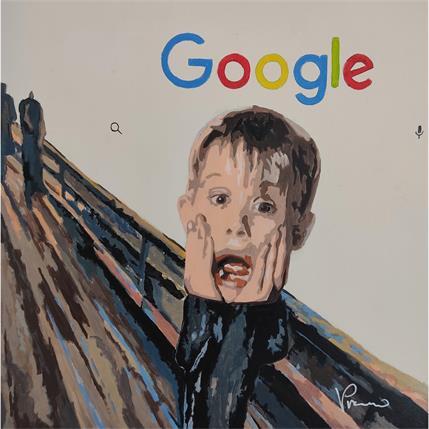Munch's 9 most famous works
- 08/08/2022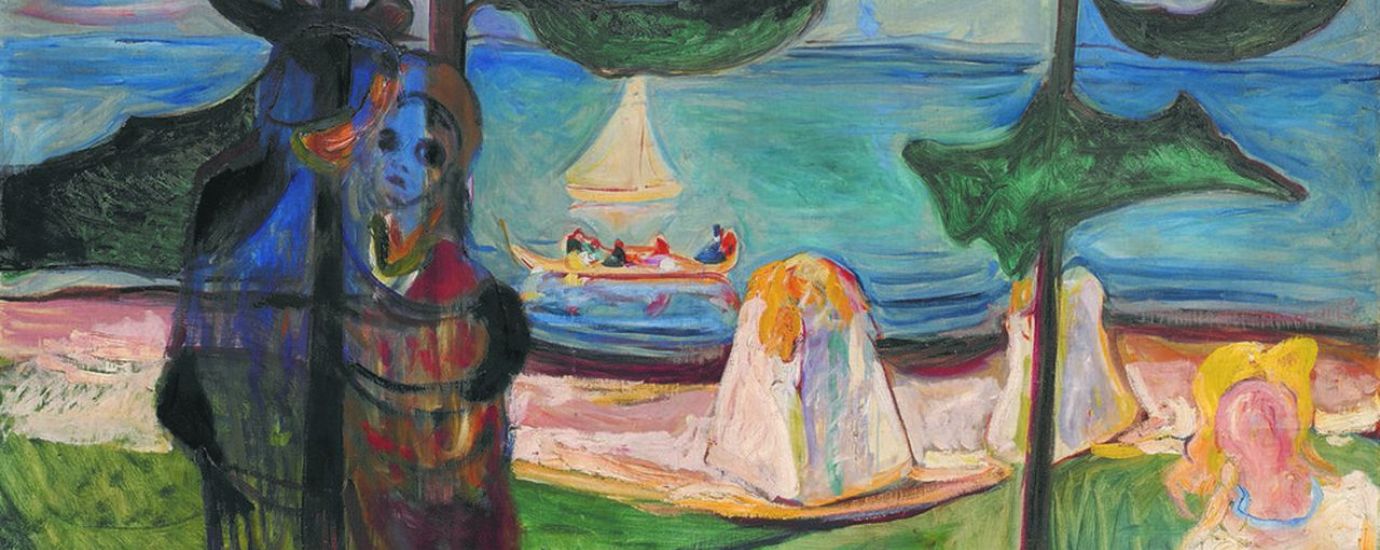
In the world of art, Munch's famous painting "The Scream" has a place in the pantheon. It is one of the world's most famous works. Fascination, horror, curiosity, the work arouses many feelings in art lovers. But it is not his only work. On the contrary, the artist created other paintings in the same spirit during his career.
The 9 most famous works by Munch :
- The Scream
- The Sick Child
- The Madonna (Madonna)
- The Vampire
- Puberty
- The Loners
- Jealousy
- Young girls on a bridge
- Kissing
EDVARD MUNCH: A TORTURED SOUL
This Norwegian painter lived between 1863 and 1944. Successive bereavements and family dramas shaped his way of painting. From the age of five, he had to overcome the death of his mother, who succumbed to tuberculosis. Then, at the age of 13, the painter lost his sister to the same disease. His brother died of pneumonia a few months after his marriage. Finally, another sister suffered from depression and spent her life in an institution.
The succession of these tragedies affected his state of mind. In fact, he fell into depression several times, a state that he expresses wonderfully in his work. This is why most of his works deal with existential and gloomy themes such as pain, fear, melancholy, death and anguish.
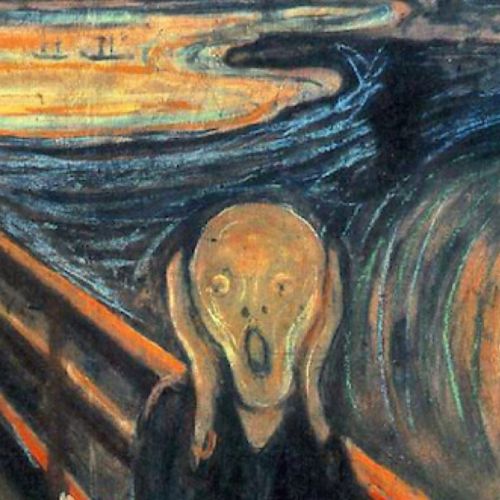
Edvard Munch, The scream, 1893
THE SCREAM : HIS MOST FAMOUS WORK
This artist is considered the precursor of expressionist painting in Scandinavia and the West. He became world famous through this work. This version is part of a series of 5 works that the artist produced between 1893 and 1917.
What is the significance of this cry ?
This work shows a figure shouting on a bridge. At first glance, one might think that it is the main character who is shouting. However, studies of this work show that he is not the source of the scream. On the contrary, he covers his ears, horrified by the scream.
The origin of the fiery red sunset
In the description of the painting, the painter reveals that the sky suddenly turned red. Astrophysicists have tried to explain this phenomenon. According to them, it is associated with the powerful eruption of a volcano in Indonesia. The sound of the eruption could be heard as far away as Northern Europe. Volcanic ash fills the sky and creates this red sunset.
The scary face
The emaciated face and lack of hair of the figure frightened the public at the time. According to historians, this face was inspired by the mummies of a South American people exhibited in Paris during the Universal Exhibition. At that time, the painter was living in the French capital. The similarities between this Peruvian mummy and the character in the work could be due to this event.
Discover the collection inspired by Edvard Munch
Edvard Munch Collection
THE SICK CHILD
Painted in 1925, The Sick Child shows a mother at the bedside of her daughter, who is bedridden due to illness. Like The Child and Death, the artist was inspired by the tragic events of his mother and sister to paint these two paintings.
He first saw the model when he accompanied his father. He spent over a year working on the canvas. The use of bright colour refers to the pain one feels when confronted with a traumatic memory. Over a period of forty years, the artist painted several versions of this work. The one we know today is the fourth.
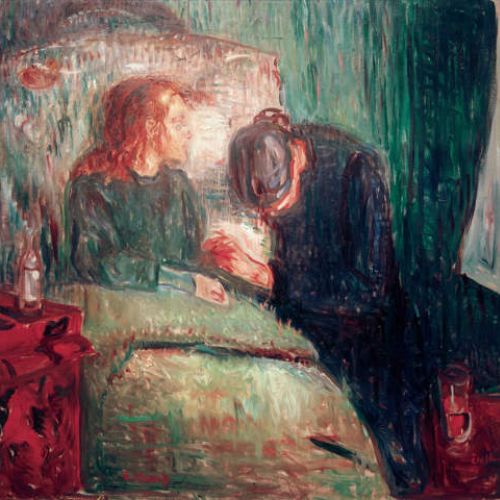
Edvard Munch, The sick child, 1925
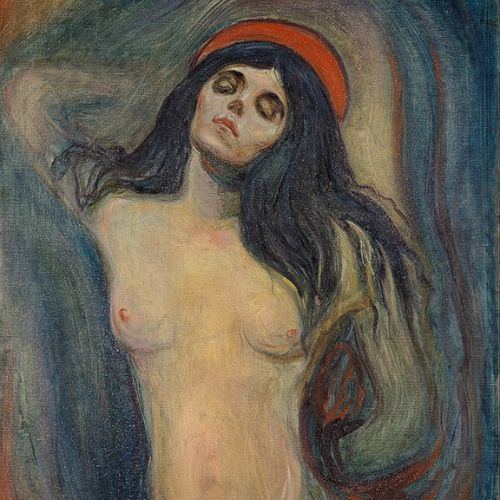
Edvard Munch, Madonna, 1895-1902
Madonna
This work shows a female figure with bare breasts and medium-length hair. Because of the name of the painting, many observers associate the work with the Virgin Mary. Others, however, dispute this version. Indeed, the artist is not particularly famous for painting religious figures.
This painting could be a tribute to the beauty of his friend and model Dagny Juel-Przybyszewska, whom he considered the ideal of femininity.
THE VAMPIRE
This painting shows a woman embracing a man. She appears to be kissing her companion on the neck and biting him. However, Munch later states that it is a woman simply kissing her man. The painting shows a desperate man finding comfort in the arms of his love.
Some say that he found the inspiration for this work during his many visits to prostitutes. Others claim that it is a macabre fantasy about his sister Sophie, who died of tuberculosis at the age of 15.
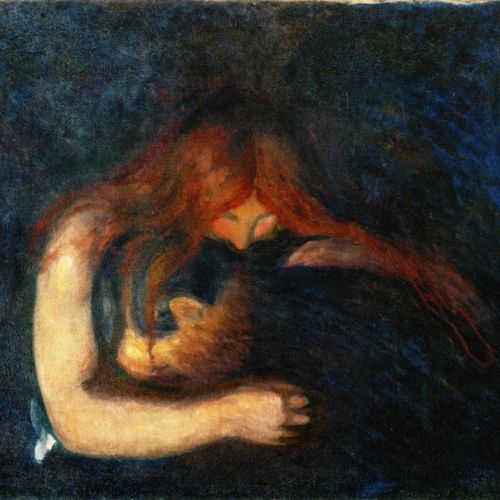
Edvard Munch, The vampire, 1893
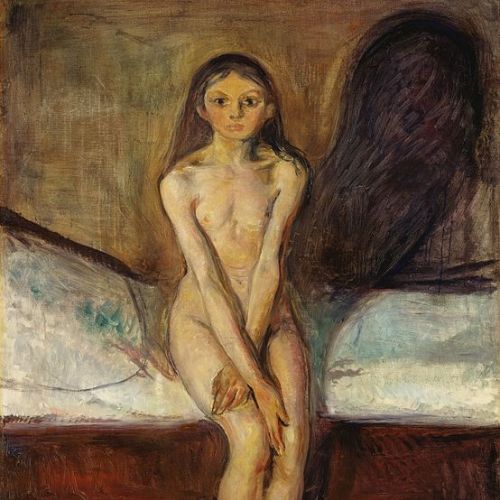
Edvard Munch, Puberty, 1894
Puberty
This work was painted in 1894, one year after Vampire. It shows a completely naked girl sitting on her bed with her hair down. The figure in the foreground seems to be staring at us with her eyes.
The work is characterised by a simple composition with horizontal lines. A menacing shadow stands behind. It is considered by specialists to be a representation of anxiety about the awakening of sexuality in a young girl.
The solitary ones
Cette œuvre affiche deux personnages que l'on voit seulement de dos. Il s'agit d'un homme et d'une femme. Les deux se tiennent à une certaine distance et il existe un contraste entre les deux This work shows two figures that can only be seen from behind. They are a man and a woman. Both are standing at a distance and there is a contrast between the two figures.
This painting could represent the distance between the man and the woman. The landscape they are looking at reinforces this notion of loneliness and longing.
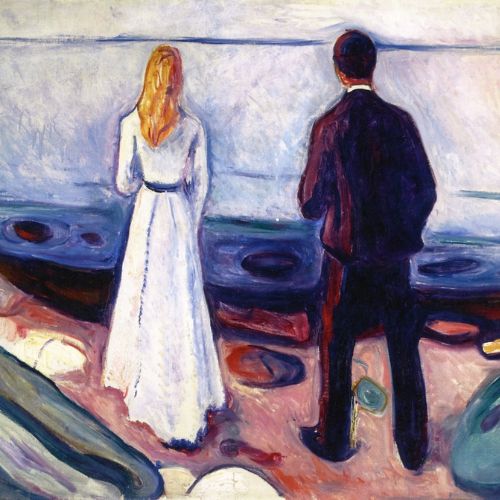
The solitary ones, 1899
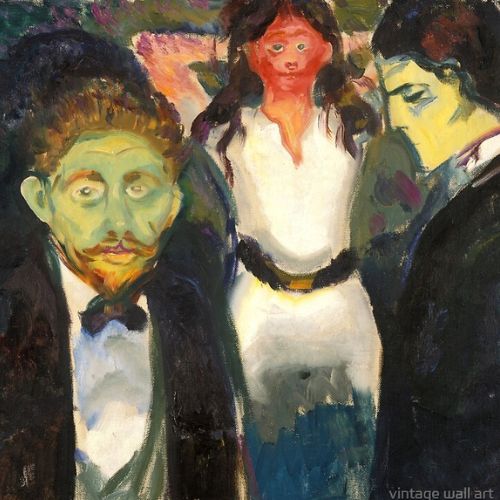
Edvard Munch, Jealousy, 1933-35
Jealousy
Jealousy was painted in several versions throughout Munch's life. He painted the first picture in 1895 and the last in 1930.
The presence of two male and one female figure refers directly to a complicated love situation associated with jealousy. The woman is standing in the middle of two men. The first has his eyes downcast, while the other stares at us.
Jeunes filles sur un pont
L'œuvre présente trois jeunes filles qui se tiennent sur un pont en admirant l'eau. Elles tournent le dos au spectateur. Entre le bâtiment en arrière-plan et le paysage en face, cette toile fait partie de ses œuvres les plus joyeuses.
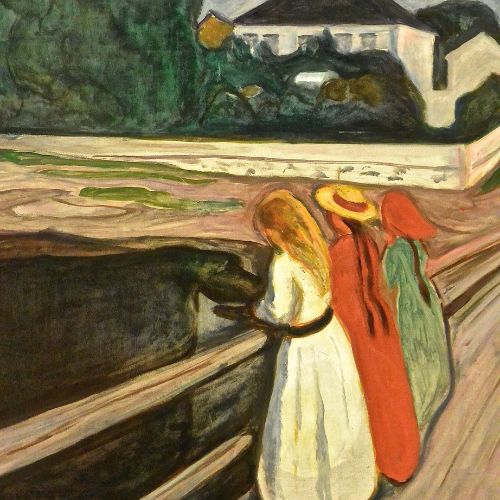
Edvard Munch, Jeunes filles sur un pont, 1899
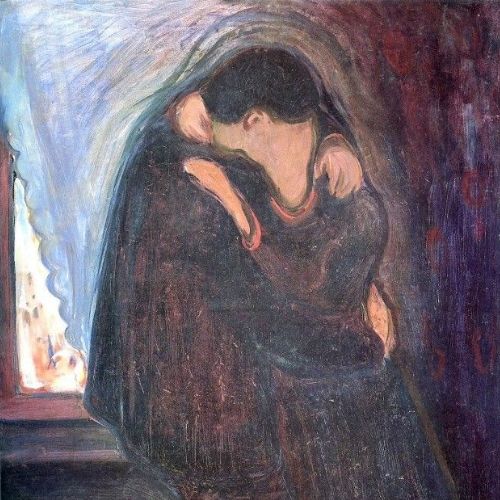
Edvard Munch, The kiss, 1897
The kiss
Read more articles about Edvard Munch :
🎨 The secret of Munch's scream
🎨 Portrait of the painter Edvard Munch, the scream of a genius!



